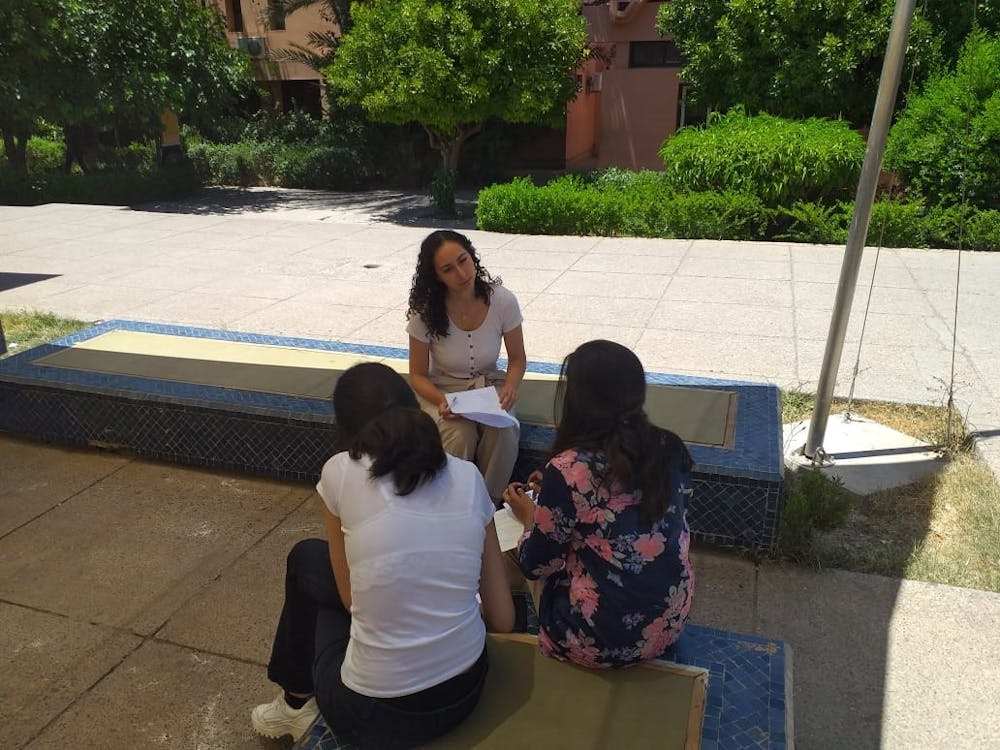The University kicked off virtual global internships for two cohorts for the spring semester three weeks ago. The program has 19 participants across four internship placements. The spring global internship program consists of a 14-week internship and a one or two-credit Global Studies topics course.
Last fall, second, third and fourth years were eligible to apply to programs in Marrakech, Morocco; New Delhi, India; Lima, Peru; and Bangkok, Thailand and everyone was accepted, although a few declined to participate.
Each city’s program has a different area of focus. The High Atlas Foundation in Morocco is focused on development and local issues, SEWA Bharat in India is concerned with supporting women’s rights and development in the informal economy, Enseña Perú in Peru is focused on education and the Pacific Licensing Studio in Thailand is a brand management and consumer products licensing agency.
An internship with the High Atlas Foundation costs $888.00 for in-state and $1,126.00 for out-of-state students while the other global virtual internships cost $494.00 for in-state and $613.00 for out-of-state students.
The application process involved submitting a resume and cover letter, along with an application to the University program. After students were selected but before their internships began, students met with the organization they would be interning with to discuss their aims and interests.
Before the pandemic, students were also able to pursue a host of global internships through the University’s global independent internship program, which included the internships offered virtually this year in Peru, India and Thailand.
“There's been some sort of consistency and pattern with internship placements, [but] it also depends on what the needs of those organizations and companies are at any given time and their capacity to take on interns,” said Margaret Waller, senior education abroad advisor and program manager.
The spring internships begin as the University’s travel ban continues until May 31. This restriction impacts all education abroad activities, including credit-bearing study abroad, research, internships and student participation in non-University education abroad programs. Furthermore, undergraduate students cannot petition for an exemption from the University restriction nor request retroactive transfer credit for coursework completed internationally while the University restriction is in place.
Some of the tasks interns will be expected to complete for the High Atlas Foundation include working with a team to develop an empowerment manual for women and girls, drafting social media content and blog posts and proposing various projects.
So far, interns have participated in class meetings and a series of workshops covering topics including the characteristics of working internationally and remotely, how to connect to and learn about a location virtually and the expected challenges and strategies for getting the most out of the experience.
Although students are not in the same physical location or time zone as the organizations they are interning with this year, students are encouraged to read local papers or set up virtual coffee dates to develop meaningful relationships with the places and people they are working with. Some of the spontaneity of being in the physical location, however, is lost because students must be more organized and intentional in the planning of their learning experiences.
Last summer, about a dozen students in groups of five or six — who had originally been intending to travel and live abroad prior to the pandemic — completed virtual internships in Morocco and India. Third-year College student Leigh Kesser, who worked with the High Atlas Foundation, was bummed that she wasn’t able to experientially engage with Moroccan culture through her internship, but still found the various projects she completed worthwhile.
“I was hoping to study abroad during college and just be able to be immersed in another culture and get to learn about it more through an existing organization,” Kesser said. “But, I'm still very, very grateful that I was able to do [the internship online]. I still feel like I was able to work on a variety of projects and still get to know my peers and the people who worked at HAF.”
Kesser’s projects included blog posts, a Facebook Live for World Rainforest Day and project proposals about topics such as the biodiversity of tending herbs in Northern Morocco.
Second-year College student Tahi Wiggins also completed a virtual internship last summer with SEWA Bharat in India, where she conducted market research, developed training models for women learning how to operate Gmail and Google forums and wrote a case study for a nationwide competition on the business correspondent model that employs women to function as the intermediaries of banks for underbanked areas in the state of Uttarakhand. Wiggins was disappointed that her internship was online but appreciated the challenge it brought.
“It was very intriguing to understand that there were aspects of the work that I would never understand because I was not there,” Wiggins said. “But also understand that there were aspects of the work that I was getting that I would not have gotten if I was actually abroad that I was having to figure out by being virtual.”
Wiggins is now in the preliminary stages of her internship with the High Atlas Foundation. Both Kesser and Wiggins hope to study abroad when the University lifts its restrictions on travel.







